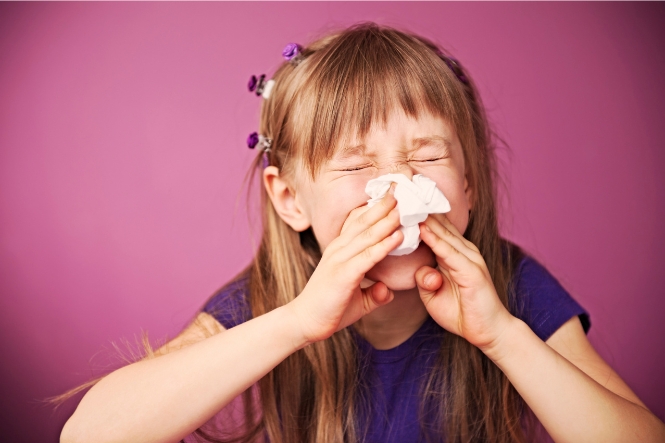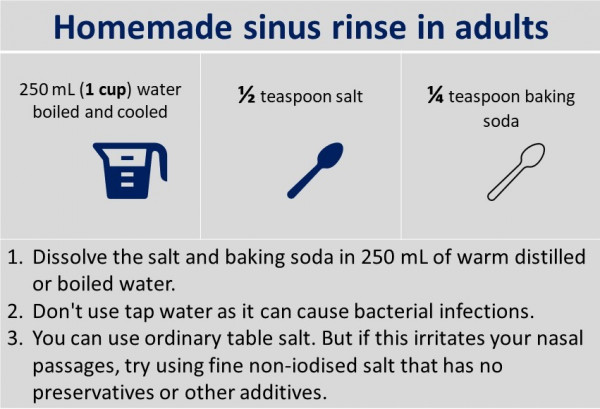Saline nasal sprays, drops and rinses
Also called salt-water nasal wash
Key points about saline nasal sprays, drops and rinses
- Saline nasal preparations are salt-water solutions used to help unblock a congested nose.
- They can help to thin the mucous and reduce the amount of secretion from the nose.
- Saline can be used safely in adults, children and babies.
- Find out how to use them safely and possible side effects.

Saline (also known as saline solution) is a mixture of sodium chloride (salt) and water. The saline allows the water to pass through delicate nasal membranes with little or no burning or irritation. Saline is used because plain water can irritate your nose.
Saline nasal sprays and drops are used to treat a blocked nose (nasal congestion) in people with colds. It can help to thin the mucous and reduce the amount of secretion from the nose. It can be used safely in adults, children and babies.
Saline rinses can remove dust, pollen and other allergens or debris, as well as help to loosen thick mucus. They can help relieve nasal symptoms of sinus infections and allergies.
In babies, only use the saline drops just before feeds and only if their nose is blocked. If saline is used too often, the skin around their nose may become irritated and sore.
| Examples of saline nasal sprays, drops and rinses that can be bought from the pharmacy |
|
| Nasal drops |
|
| Nasal spray |
|
| Nasal rinse |
|
Babies and children
It is best to use saline products bought from the pharmacy. They come in the right strength and in the right device that makes them easy to use and store. If you can't afford the saline products mentioned above, ask your pharmacist for advice.
Sinus rinse for adults

To rinse your nose:
- wash and dry your hands
- stand over a sink, cup the palm of one hand and pour a small amount of the solution into it
- sniff the water into one nostril at a time.
Repeat these steps until your nose feels more comfortable (you may not need to use all of the solution). You should make a fresh solution each day. Don't re-use a solution made the day before. Special devices, such as a sinus rinse bottle or neti pot, can be used instead of your hand. These are available from pharmacies. If you choose to use one of these, make sure you follow the manufacturer's instructions about using and cleaning it.
Why does water need to be boiled first?
When making up the saline nasal solution it's important that the water used has been boiled and cooled. Tap water isn't safe for use because it's not completely filtered or treated. Some tap water has a low level of bugs (bacteria) that may be safe to swallow (because the stomach acids kill them), but in your nose, these bugs can cause infection.
Boil the water for 3 to 5 minutes, then cool until it's lukewarm. Boiled water can be stored in a clean container for use within 24 hours.
Using saline drops, sprays and rinses is quite safe. They can sometimes cause mild discomfort and minor nose bleeds. Contact your healthcare provider if you have any discomfort, nose bleeds or ear pain.
The following links have more information on saline nasal products. Be aware that websites from other countries may contain information that differs from New Zealand recommendations.
Saline nasal douches(external link) ENT Group, Auckland, NZ
Nasal irrigation – is it safe?(external link) Public Health, WA, Australia
Saline irrigation for sinus problems(external link) American Family Physician, US
Saline nasal irrigation(external link) Univ of Wisconsin, US
Resources
5 questions to ask about your medications(external link) Health Quality and Safety Commission, NZ, 2019 English(external link), te reo Māori(external link)
References
- Cold season in primary care(external link) BPAC, NZ, 2013
- Blocked nose in babies (snuffles)(external link) Patient Info, UK
- Do cough and cold medicines work in children?(external link) BPAC, NZ, 2010
- Sinusitis - treatment(external link) NHS, UK
- Is rinsing your sinuses with neti pots safe?(external link) FDA, US, 2012
Brochures

Medicines and side effects
Healthify He Puna Waiora, NZ, 2024

Health Quality and Safety Commission, NZ, 2019 English, te reo Māori
Credits: Sandra Ponen, Pharmacist, Healthify He Puna Waiora. Healthify is brought to you by Health Navigator Charitable Trust.
Reviewed by: Angela Lambie, Pharmacist, Auckland
Last reviewed:
Page last updated:





